Share

Critical Care Time
24. Thrombocytopenia with Dr. Matthew Rendo, MD.
Season 1, Ep. 24
•
Thrombocytopenia is a puzzling, yet common problem in the ambulatory setting, on the wards and certainly in critically ill patients! Having an understanding of why it matters, why it can happen and what we should do about it, is of paramount importance to you if you are committed to excellent patient care.
Given that patient care is first and foremost for us at Critical Care Time, we’ve teamed up - once again - with hematologist extraordinaire Matthew Rendo (X: RendOncology) to help us develop a pragmatic approach to managing the patient with thrombocytopenia.
Please give it a listen and let us know what you think!
More episodes
View all episodes

70. The People’s Ventricle with Dr Matt Siuba
01:39:09|Buckle up because on this week's episode of Critical Care Time we are treated to a master class on Right Heart Failure with world-class educator Dr. Matt Siuba. We are taking a deep dive on diagnosis, management and of course, sharing our love for the PAC! Make sure you clear your schedule and take notes for this one because as far as we are concerned, this is required listening for anyone who cares for the critically ill!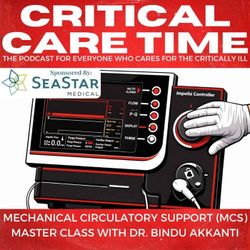
69. Mechanical Circulatory Support Master Class with Dr. Bindu Akkanti
01:45:45|Folks this right here is a JAM PACKED episode of CCT goodness for you guys to enjoy! In this show for the ages we take a deep dive into the world of Mechanical Circulatory Support (MCS) and Cardiopulmonary Critical Care with one of the best in the biz, Dr. Bindu Akkanti! We will go through several fictional patients illustrating use cases, pitfalls and pearls of tools such as the balloon pump, ECMO and the microaxial flow devices used in ICUs all over the globe to help care for the sickest of the sick. If these tools ring a bell or if you are just interested in how we optimize care for these types of patients, give us a listen and let us know what you think!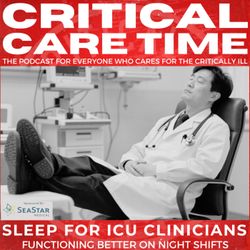
68. Sleep for ICU Clinicians: Functioning Better on Night Shifts
01:07:45|On this week’s BONUS episode of Critical Care Time, Cyrus & Nick flip the coin on sleep and discuss the importance of sleep for those of us that have to work nights. We also discuss how to find ways to still get rest even when your whole world is flipped upside down! Be prepared to keep taking excellent care of your patients using some of the tricks we review here. Give it a listen - or a watch and let us know what you think!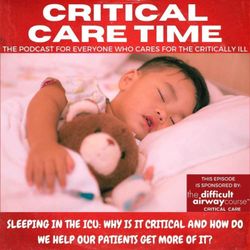
67. Sleeping in the ICU: Why is it critical and how do we help our patients get more of it?
01:18:52|On this episode of Critical Care Time we delve into the fascinating world of sleep with a focus on the importance of sleep in our ICU patients and how we can promote good quality sleep in the sickest patients in the hospital. Try not to sleep through this one as we provide some valuable insights and high quality pearls to get you geared up and ready to be a champion for sleep in your ICU! As always, listen and let us know what you think. Special thanks to The Difficult Airway Course: Critical Care, for sponsoring this episode!
66. Rheumatology Emergencies with Dr. Marcela Ferrada
01:31:17|On this episode of Critical Care Time, we tackle the enigma - shrouded in mystery and caped in uncertainty - know as rheumatologic emergencies in the critically ill patient! We sit down with Dr. Marcela Ferrada - a QUADRUPLE boarded intensivist/rheumatologist/ID specialist and internist - who guides us through her approach to rheumatologic emergencies in the sickest of the sick. As we often do, we approach this via a pragmatic, cased-based journey for your listening pleasure. Please check it out, learn all you can, and as always - let us know your thoughts and leave a review!Special thanks to returning sponsor, Seastar Medical for supporting us with this production!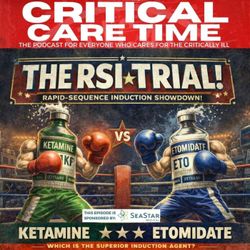
65. Journal Club: The RSI Trial
29:16|This Critical Care Time bonus is our ode to RSI... that is the RSI Trial! In this episode, we'll unpack all the important elements of the recently released RSI Trial by the Pragmatic Critical Care Research Group exploring whether there is a signal favoring etomidate vs ketamine for tracheal intubation of critically ill adults. Does one drug reign supreme? Is this practice changing, practice affirming or perhaps the devil's in the details? Listen, learn and let us know YOUR thoughts!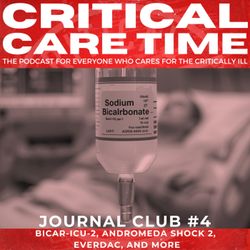
64. Journal Club: End of 2025 Roundup
01:20:33|This week we drop a journal club extravaganza! Should we do away with the A-Line? Is Bicarb a sure-fire way to treat metabolic acidosis in the setting of AKI? What about selective decontamination and all that capillary refill business!? We tackle all these topics through thoughtful journal discussion, provide our $0.02 and a little witty repartee, of course! Check it out and let us know what you think!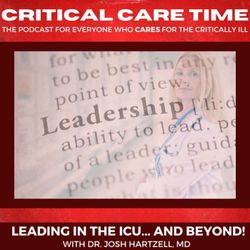
63. Leading in the ICU… and Beyond!
01:12:53|The importance of leadership in the hospital setting is critically important yet often overlooked. It’s even more important to have sound leaders and adhere to well-founded leadership practices when taking care of the critically ill. Join us as we sit down with Dr. Josh Hartzell - internist, infectious disease physician, author, veteran and physician-leader - as we discuss Leading in the ICU and Beyond!As always, please leave us feedback and let us know what you think!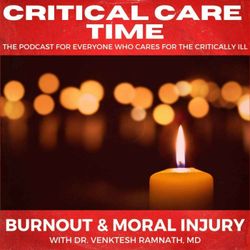
62. Burnout & Moral Injury
01:20:59|For those who work in an ICU - or with any patients for that matter -the concepts of burnout and moral injury are no stranger. In order to mitigate the effects of these forces, it’s important to understand them. Join Nick and Cyrus, as they sit down with an incredible guest, Dr. Venktesh Ramnath, with the hopes of doing just that. On this episode we step away from the pressors and central lines and focus on the contributors to burn out and moral injury in the medical field while developing some strategies to combat them. Listen, watch, learn and let us know what you think!